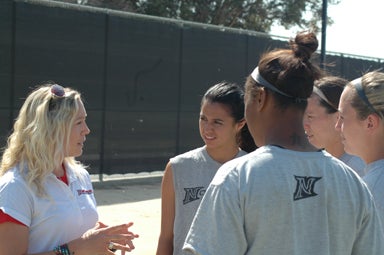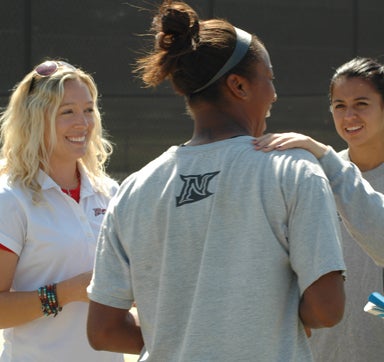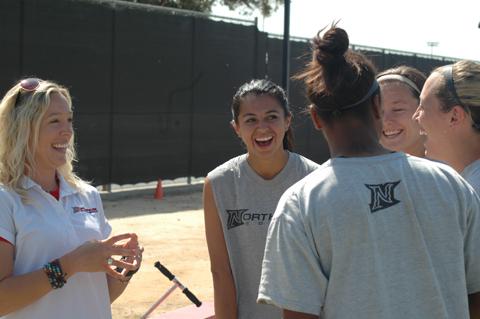Ashley Samson is an Assistant Professor in Kinesiology and Sport Psychology Consultant for Athletics at CSUN. She works with student athletes for optimal performance, but winning is not the entire goal. The objective is a balanced life and a satisfying career – whether athletics is pursued or another choice is made after graduation. CSUN student athletes are a unique demographic in that the university is a Hispanic-Serving Institution (HSI), and many of the students represent the first generation in their families to attend college. “Both of these characterizations present a unique set of stressors,” Samson said, “But we don’t want school to become a source of stress, so we work toward balance and well being from a holistic point of view.”
Successfully navigating the path through college can be stressful for any student. Finances, transportation, relationships, school-related demands and personal issues can mount up quickly. Add a performance-based activity and stress levels can increase even more, so it is important for the student athlete to understand the factors that increase stress and learn tools to deal with issues in healthy ways.
To gather evidence and strengthen programs that support the overall well being of student athletes, Samson is working on a project in collaboration with Athletics’ Assistant Athletic Director for Sports Medicine Steve Grech and Director of University Counseling Services, Mark Stevens to engage student athletes in learning to bring stressors down where possible, teach them how to cope with the ones they can’t control, and find the balance between.
“Both Mark and I have noticed that family stressors are a big part of what student athletes are dealing with. Some come to represent hope for the economic future of the whole family,” Samson said. “And while that seems like a heroic stance from the outside, it translates to a lot of pressure to reach meteoric heights faster than is even possible.”

Samson started working with CSUN teams last year, consulting with men’s Golf, Women’s Softball and the men’s and women’s soccer teams. Whether meeting with players individually or conducting group meetings, she focuses on goal setting, self awareness, positive self-talk, communication, confidence, focus and mental endurance. “Self awareness is at the heart of this work, and the athletes have been very receptive,” she said.
In fact, the students were getting so much out of the sessions, Samson I started getting more clients than she could take on. That led to her requesting a meeting with Athletics Director, Brandon Martin. “His focus on ‘Comprehensive Excellence’ is right in line with the practices I’m getting the students to work on,” Samson said, “Dr. Martin and I talked about the athletes’ needs as students, as athletes, as people.”
“Ashley’s work is congruent with our priorities related to student-athlete welfare.” Martin said. “Our charge is to foster an environment that challenges them to grow intellectually, socially, and athletically. Ashely has a deep understanding of our goals focused on the holistic development and growth of our student-athletes.”
The Sport Psychologist also teaches the student athletes ways to manage their daily actions and how to shape an attitude about success. All parts come together to give the student new ways to continue to grow and develop. “Our partnership with the College of Health and Human Development is invaluable,” Martin added. “We are grateful as a department to work with scholars and practitioners that give our student-athletes the support they need and deserve.”
So, starting in fall 2014 semester, Samson will balance her time and talent between the academic discipline in Kinesiology and the applied work—the sessions--with the Athletics Department, “It’s a win/win,” Samson said.

“My focus for a session may start out as being about performance enhancement, but sometimes an athlete will come in describing trouble focusing during the game. Conversation may bring out the realization that stress isn’t specific to the playing field. There is often something going on at home, or the student is feeling overwhelmed with school, something bigger than just the game,” Samson said, “So partnering with Mark Stevens, we’re looking at a variety of stressors on the athletes. The study is to get a better look at what that scenario is.”
And in some cases, a low socio economic status in the family drives pressure onto the student athlete to “make it out” and help the family after graduation, with dreams of professional athletics that may or may not be where the student athlete sees his or her life heading. And the conflict between pleasing others and finding one’s own way can edge out the game and create a sense of desperation.
“I’ve had first-year athletes say to me, ‘I want to be a pro to buy my mom a house,’” Samson said, “These are 18 year old kids. They feel like they have to hit the jackpot on the first try but they’re also faced with dealing with a world they don’t yet understand. They don’t yet have the life experience to understand that building a career, beyond talent and commitment, takes time and getting to know oneself.
In the meantime, there is a university and a team and a game, and a routine. The student learns to balance life. “That’s what we’re there to teach: balance. And the happy result of that,” Samson added, “is a winning attitude.
-Jean O'Sullivan
SP2014

